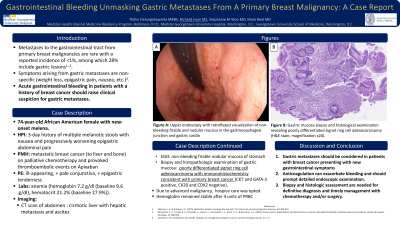Sunday Poster Session
Category: GI Bleeding
P0666 - Gastrointestinal Bleeding Unmasking Gastric Metastases From a Primary Breast Malignancy: A Case Report
Sunday, October 22, 2023
3:30 PM - 7:00 PM PT
Location: Exhibit Hall

Has Audio

Thilini Delungahawatta, MBBS
MedStar Health
Baltimore, MD
Presenting Author(s)
Thilini Delungahawatta, MBBS1, Richard Hum, MS2, Stephanie M. Woo, MD3, Mark Real, MD3
1MedStar Health, Baltimore, MD; 2Georgetown University School of Medicine, Washington, DC; 3MedStar Georgetown University Hospital, Washington, DC
Introduction: Metastasis to the gastrointestinal tract from primary breast malignancies is rare. Moreover, symptoms arising from gastric metastases are non-specific, often delaying diagnosis and therapeutic potential. Acute gastrointestinal bleeding in patients with history of breast cancer, however, should raise clinical suspicion and warrant further investigation for metastatic disease involving the gastrointestinal tract.
Case Description/Methods: We report a case involving a 74-year-old African American female with metastatic breast cancer and provoked thromboembolic events on anticoagulation, presenting with new-onset melena. She described multiple episodes of dark, tarry stools with nausea, and progressively worsening epigastric abdominal pain that was sharp in nature and radiating across her upper abdomen. She had switched from Warfarin to Apixaban approximately 1 year ago. Laboratory values were remarkable for anemia (hemoglobin 6.8 g/dl, hematocrit 20.3%). A CT scan of the abdomen demonstrated progression of peritoneal carcinomatosis and metastatic liver disease but no newly identifiable metastasis. An esophagogastroduodenoscopy was then performed showing non-bleeding friable nodular mucosa in the gastric cardia, body, and incisura. Biopsy and histopathologic examination confirmed poorly differentiated signet ring cell adenocarcinoma with immunohistochemistry consistent with primary breast cancer (CK7 and GATA-3 positive, CK20 and CDX2 negative). The patient decided not to pursue further treatment and opted for palliative care. Hemoglobin remained stable after 4 units of blood transfusion.
Discussion: Though rare, our case highlights the need to consider gastric metastases in patients with breast cancer, especially when presenting with new gastrointestinal symptoms, such as melena or hematochezia. Use of anticoagulation can exacerbate bleeding and thereby prompt detailed endoscopic examination. Biopsy and histologic assessment are needed for definitive diagnosis and timely management with chemotherapy and/or surgery.

Disclosures:
Thilini Delungahawatta, MBBS1, Richard Hum, MS2, Stephanie M. Woo, MD3, Mark Real, MD3. P0666 - Gastrointestinal Bleeding Unmasking Gastric Metastases From a Primary Breast Malignancy: A Case Report, ACG 2023 Annual Scientific Meeting Abstracts. Vancouver, BC, Canada: American College of Gastroenterology.
1MedStar Health, Baltimore, MD; 2Georgetown University School of Medicine, Washington, DC; 3MedStar Georgetown University Hospital, Washington, DC
Introduction: Metastasis to the gastrointestinal tract from primary breast malignancies is rare. Moreover, symptoms arising from gastric metastases are non-specific, often delaying diagnosis and therapeutic potential. Acute gastrointestinal bleeding in patients with history of breast cancer, however, should raise clinical suspicion and warrant further investigation for metastatic disease involving the gastrointestinal tract.
Case Description/Methods: We report a case involving a 74-year-old African American female with metastatic breast cancer and provoked thromboembolic events on anticoagulation, presenting with new-onset melena. She described multiple episodes of dark, tarry stools with nausea, and progressively worsening epigastric abdominal pain that was sharp in nature and radiating across her upper abdomen. She had switched from Warfarin to Apixaban approximately 1 year ago. Laboratory values were remarkable for anemia (hemoglobin 6.8 g/dl, hematocrit 20.3%). A CT scan of the abdomen demonstrated progression of peritoneal carcinomatosis and metastatic liver disease but no newly identifiable metastasis. An esophagogastroduodenoscopy was then performed showing non-bleeding friable nodular mucosa in the gastric cardia, body, and incisura. Biopsy and histopathologic examination confirmed poorly differentiated signet ring cell adenocarcinoma with immunohistochemistry consistent with primary breast cancer (CK7 and GATA-3 positive, CK20 and CDX2 negative). The patient decided not to pursue further treatment and opted for palliative care. Hemoglobin remained stable after 4 units of blood transfusion.
Discussion: Though rare, our case highlights the need to consider gastric metastases in patients with breast cancer, especially when presenting with new gastrointestinal symptoms, such as melena or hematochezia. Use of anticoagulation can exacerbate bleeding and thereby prompt detailed endoscopic examination. Biopsy and histologic assessment are needed for definitive diagnosis and timely management with chemotherapy and/or surgery.

Figure: Upper endoscopy with A) retroflexed visualization of non-bleeding friable and nodular mucosa in the gastroesophageal junction and gastric cardia with B) gastric mucosa biopsy and histological examination revealing poorly differentiated signet ring cell adenocarcinoma (hematoxylin-eosin stain, magnification x20).
Disclosures:
Thilini Delungahawatta indicated no relevant financial relationships.
Richard Hum indicated no relevant financial relationships.
Stephanie Woo indicated no relevant financial relationships.
Mark Real indicated no relevant financial relationships.
Thilini Delungahawatta, MBBS1, Richard Hum, MS2, Stephanie M. Woo, MD3, Mark Real, MD3. P0666 - Gastrointestinal Bleeding Unmasking Gastric Metastases From a Primary Breast Malignancy: A Case Report, ACG 2023 Annual Scientific Meeting Abstracts. Vancouver, BC, Canada: American College of Gastroenterology.
